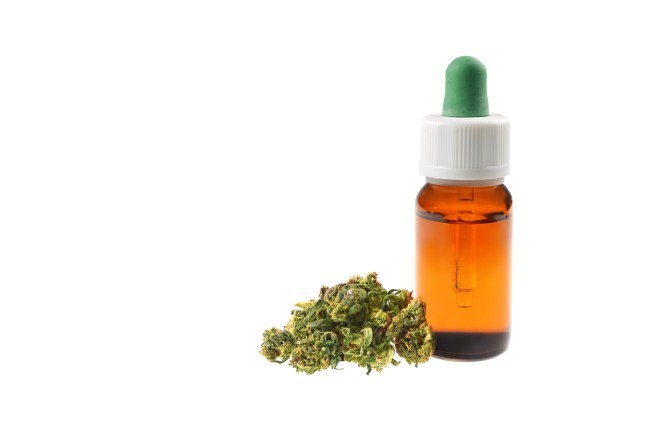
istock
Although marijuana is legal in over half the nation for medicinal use, the herb is far from being recognized as a legitimate therapeutic substance. Since anything derived from the cannabis plant remains illegal at the federal level, there is a wealth of hoops and hassles that can arise from climbing aboard as a legal patient. Medical marijuana cardholders are often prevented from finding and or maintaining gainful employment because of their involvement in these programs. It has also caused patients trouble when it comes finding places to live or qualifying for government benefits.
All of these injustices brought about through conflicting marijuana laws are largely publicized. But perhaps the one situation involving medical marijuana and its impact on the lives of American citizens that is not, is that its medicinal application, even in states where it is legal, is keeping young, promising athletes from perusing their sports careers.
It was several years ago when Georgia resident C.J. Harris, a senior at Warner Robins High School, was diagnosed with epilepsy. Although traditional medicine was unable to control his seizures, Harris found success in a non-intoxicating form of cannabis oil.
Enjoyed my visit at Auburn. Thanks @CoachBrownAU and @AuburnFootball for having me. War Eagle!!!🦅 @RecruitGeorgia @TaylorJones__ pic.twitter.com/YEs9J1sIJo
— CJ Harris (@CurtisJavonHar5) January 30, 2018
Not often that a player can say they get to play for their dream school. God is a great God.. @RecruitGeorgia @sportsguymarv @PlayBookAthlete @TaylorJones__ @247Sports @AuburnFootball @CoachBrownAU @SleeperRecruit @CamWGXA @xixnyne @CoachGusMalzahn @AuburnTigers @coach_ksteele pic.twitter.com/f29XM4f99j
— CJ Harris (@CurtisJavonHar5) February 7, 2018
Georgia lawmakers legalized the possession of cannabidiol (CBD) back in 2015 for patients with epilepsy. The only stipulation is that they must first get permission from their doctor and register with the state.
This is exactly what Harris did.
By the beginning of 2017, he was a seizure-free thanks to CBD. It seemed that his life would now carry on, as it should for any young man ready to grab the bullish world by the horns. He went on to lead his high school football team, the Warner Robins Demons, to the state championship. In fact, his ability in the sport was so impressive that he was offered a preferred walk-on at Auburn University – ensuring him a spot on his dream team.
“When I read the text that one of the coaches sent me, I just, I broke down,” Harris told ABC-affiliate WGXA. “Because this is my dream, and I saw everything lining up perfectly for me.”
But an unforeseen snag was looming in the distance. Harris would soon learn that he had been disqualified from playing football at Auburn because he tested positive for marijuana — a substance that not only prevents him from having seizures, but one that, in his case, is legal.
It was news that would crush Harris’ aspiration of becoming an Auburn Tiger or joining any other team under the thumb of the NCAA. This is because the association has a strict policy against marijuana. The rules state that no player (or prospective player) is allowed to test positive for any measurable amount of tetrahydrocannabinol (THC). Although the cannabis oil that Harris uses is mostly cannabidiol, which is, again, a non-intoxicating from of the herb, it does contain trace amounts (0.3 percent) of THC. This is all legal under Georgia law. But as long as Harris is trying to control his seizures with this medication, his chances of passing a drug test are slim.
Although some athletes at this level say it is easy to pass those pesky required drug screens for the NCAA, many of these players are only using marijuana for recreational purposes. Any time Harris takes away from cannabis oil to clean up for a drug test will only put him at risk for having dangerous seizures. At the end of the day, Harris must choose between his health and career – something his father, Curtis, believes is unfair.
“You’re taking something away from a kid who’s worked so hard in his life to get there,” he told the news source. “And you’re just taking it away because he’s taking a medication that’s helping with his disability.”
Unfortunately, marijuana and sports do not mix. As it stands, all college and professional leagues prohibit the use of marijuana, even if it is only for its therapeutic benefits.
Recently, the NFL denied free agent running back Mike James the freedom to use cannabis to combat the chronic pain he has experienced since receiving an ankle injury back in 2013. But James, who began using medicinal cannabis as a way out of opioid addiction, wants to return to football. But he will not be able to move forward, at least not with ease, as long as he continues treating his condition with medical marijuana.
Despite the fact that legal cannabis is gaining traction at the state level, nothing is expected to change with respect to the drug policies of the NCAA or NFL until the federal government finally ends prohibition. It is for this reason that it is important to start pressuring lawmakers at the top of the food chain for a reasonable response to this popular issue.
It’s what America wants.
Some of the latest polls show that around 90 percent of the population believes marijuana should be made legal nationwide for medicinal use. Considering there is such an outpouring of support, it is difficult to understand why these antiquated drug laws are still keeping young patients like C.J. Harris from their pursuit of happiness.